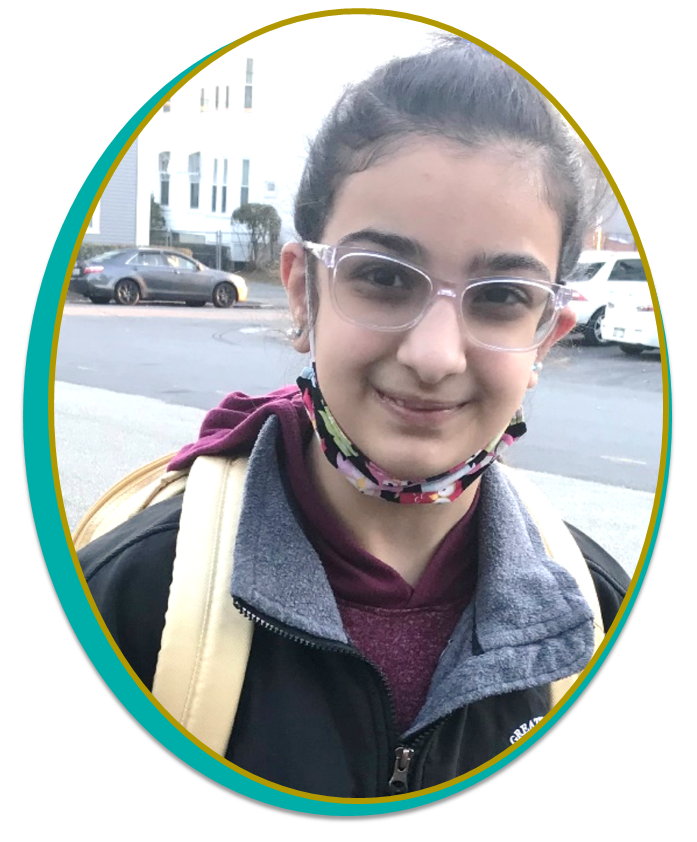Tiba

A pair of sparkly pink eye glasses made a little girl’s heart sing – and life a bit easier for a family that had already been through so much.
Support from people like you made that possible.
In many ways, Tiba is a typical 11-year old, learning to cope in the middle of a pandemic. She loves to draw and play outside with her four siblings. She adores pizza.
When Tiba was in second grade, she started having trouble seeing the blackboard in school, making it hard for this eager learner to complete assignments. The family assumed she needed glasses. A simple fix, right?
Thanks to people like you, 11-year-old Tiba and her family have one more reason to smile these days.
After several eye exams and trips to specialists, it became clear that Tiba’s condition was far more complex. Then, the seizures started. Once, twice, then more and more frequently.
After hours spent in doctors’ offices and hospital rooms, Tiba’s parents learned their daughter had a rare genetic disorder called Neuronal Ceroid Lipofuscinosis or Batten Disease, which causes vision impairment along with physical and cognitive decline.
As you might imagine, the fact that there is no cure on the horizon was the worst possible news her parents could receive.
“Even at night we worry,” Salah explains. “She needs help with everything.”
A specialist in Boston recommended that Tiba get new glasses with transition lenses. They would help protect her sensitive eyes when playing outside with her siblings or watching her favorite cartoon, Curious George.
Transition lenses are expensive, and they are not covered by MassHealth, which is the family’s insurer. Tiba’s family simply could not afford them.
Thanks to a bit of teamwork and our Glasses for Families Fund, created by caring people like you, Tiba was able to get the lenses she needed and the frames any pre-teen would be excited to wear.
“I was in disbelief that the Health Center was able to step in and take care of this for us – and so quickly!” Tiba’s dad, Salah marvels.
Now, he says, “Tiba is so happy, she wears them all day and doesn’t take them off until she goes to bed. It’s so much better for her. You can’t imagine how grateful we are.”
Like many Lowell CHC patients, Tiba’s family came to the U.S. already having experienced what you might consider insurmountable adversity.
After fleeing Iraq as a refugee, Salah ended up in Jordan, where he met his wife and had five children. With help from the UN, and an unimaginable amount of paperwork, this hopeful family arrived in the US in 2013, with no money and little more than the clothes on their backs.
Never defeated, they worked hard to make a life for themselves in this new, unfamiliar place.
“Any new beginning is hard,” Salah says with solemn optimism. “But not speaking the language, not knowing the way of life – it’s like you’re walking but you’re frozen in place.”
Soon after arriving in Lowell, the family visited Lowell Community Health Center’s Refugee Health Assessment Program at our Metta Health Center. In Salah’s words, “it was a tremendous relief.”
As you can imagine, the Health Center connection would prove to be a lifeline for this family once again, when Tiba became ill. Pediatric Nurse Case Manager, Carla Sabbouh, also a certified Medical Interpreter, is able to communicate directly with the family in Arabic. She assists with everything from medications to working with Tiba’s school.
“Anything we need, we call Carla. She never comes up short,” Salah says.
Tiba’s family doesn’t know what course her health will take, or what the future will hold for their precious daughter. In the meantime, they, and we, are committed to doing everything in our power to give her the best quality of life possible.
At a time when much in this world seems uncertain, we must
return to what’s most important: each other.
As 2020 comes to a close, you can help us keep our commitment to Tiba, and all of our patients, by making a gift today to the Lowell CHC Annual Fund.


